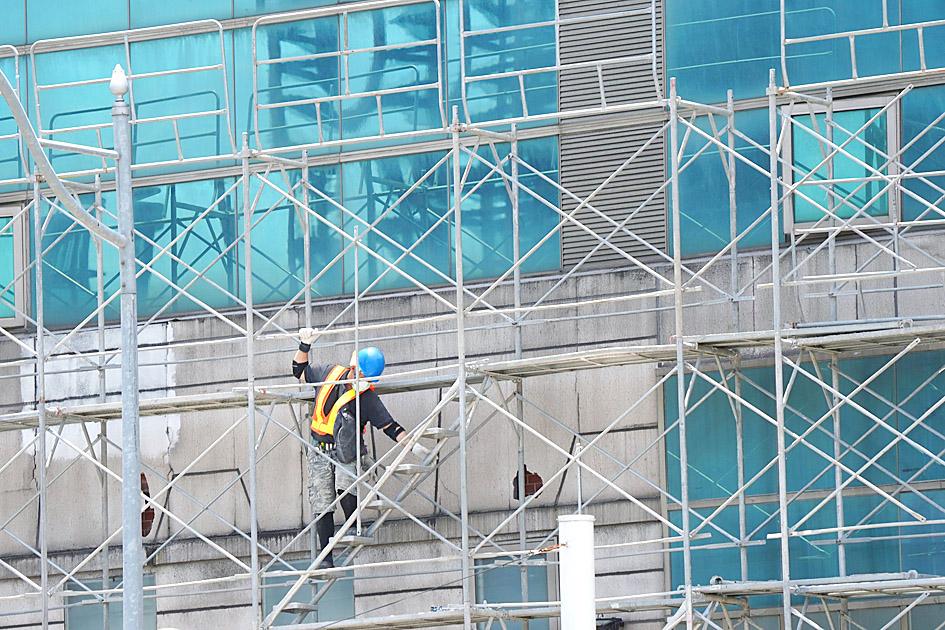The government’s business climate monitor for last month flashed “red” for a third straight month, indicating a booming economy that has not yet reflected a recent surge in COVID-19 infections in the nation, the National Development Council said yesterday.
The overall score increased by 1 point to 41, the highest since May 1987, thanks to improving customs-cleared exports, although the readings on export orders and new construction floor space retreated slightly, the council said.
“It is too early to gauge the pinch of the outbreak on the economy, as it would depend on how long it persists,” NDC research director Wu Ming-huei (吳明蕙) told an online news conference in Taipei.

Photo: CNA
The council uses a five-color code to depict the nation’s economic picture, with “green” indicating steady growth, “red” suggesting a boom and “blue” signaling a recession. Dual colors indicate a transition.
The health crisis could erode GDP growth for this year by 0.06 percentage points if authorities could bring it under control next month, Wu said, adding that the damage would deepen to 0.53 percentage points if the outbreak extends into the third quarter.
Wu expects the adverse impact to be limited to businesses reliant on domestic demand, while exporters might continue to benefit from inventory-building demand, as major economies emerge from the pandemic.
The index of leading indicators, which projects the economic scenario in the next six months, slipped 0.02 percent to 104.72, ending 11 months of increases after the sub-indices on export orders and construction floor area registered negative cyclical movements, the council said.
The slippage is small and harmless, as a majority of firms are expecting a business pickup moving forward, he said.
New construction floor area fell mainly due to fewer office building projects, while residential projects continued to increase, Wu said.
The index of coincident indicators, which mirrors the current economic situation, gained 0.77 percent to 106.17, rising for 11 consecutive months, the council said.
The council also said that it would release its business climate figures for this month in July, rather than next month, as the Directorate-General of Budget, Accounting and Statistics said it needed more time to compile unemployment data.

UNCERTAINTY: Innolux activated a stringent supply chain management mechanism, as it did during the COVID-19 pandemic, to ensure optimal inventory levels for customers Flat-panel display makers AUO Corp (友達) and Innolux Corp (群創) yesterday said that about 12 to 20 percent of their display business is at risk of potential US tariffs and that they would relocate production or shipment destinations to mitigate the levies’ effects. US tariffs would have a direct impact of US$200 million on AUO’s revenue, company chairman Paul Peng (彭雙浪) told reporters on the sidelines of the Touch Taiwan trade show in Taipei yesterday. That would make up about 12 percent of the company’s overall revenue. To cope with the tariff uncertainty, AUO plans to allocate its production to manufacturing facilities in

TAKING STOCK: A Taiwanese cookware firm in Vietnam urged customers to assess inventory or place orders early so shipments can reach the US while tariffs are paused Taiwanese businesses in Vietnam are exploring alternatives after the White House imposed a 46 percent import duty on Vietnamese goods, following US President Donald Trump’s announcement of “reciprocal” tariffs on the US’ trading partners. Lo Shih-liang (羅世良), chairman of Brico Industry Co (裕茂工業), a Taiwanese company that manufactures cast iron cookware and stove components in Vietnam, said that more than 40 percent of his business was tied to the US market, describing the constant US policy shifts as an emotional roller coaster. “I work during the day and stay up all night watching the news. I’ve been following US news until 3am

COLLABORATION: Given Taiwan’s key position in global supply chains, the US firm is discussing strategies with local partners and clients to deal with global uncertainties Advanced Micro Devices Inc (AMD) yesterday said it is meeting with local ecosystem partners, including Taiwan Semiconductor Manufacturing Co (TSMC, 台積電), to discuss strategies, including long-term manufacturing, to navigate uncertainties such as US tariffs, as Taiwan occupies an important position in global supply chains. AMD chief executive officer Lisa Su (蘇姿丰) told reporters that Taiwan is an important part of the chip designer’s ecosystem and she is discussing with partners and customers in Taiwan to forge strong collaborations on different areas during this critical period. AMD has just become the first artificial-intelligence (AI) server chip customer of TSMC to utilize its advanced

Six years ago, LVMH’s billionaire CEO Bernard Arnault and US President Donald Trump cut the blue ribbon on a factory in rural Texas that would make designer handbags for Louis Vuitton, one of the world’s best-known luxury brands. However, since the high-profile opening, the factory has faced a host of problems limiting production, 11 former Louis Vuitton employees said. The site has consistently ranked among the worst-performing for Louis Vuitton globally, “significantly” underperforming other facilities, said three former Louis Vuitton workers and a senior industry source, who cited internal rankings shared with staff. The plant’s problems — which have not